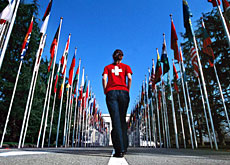A tough balancing act

History shows that a federal system is well suited to multicultural societies, but only if they are prepared to share power with central government.
Countries such as Switzerland, Belgium and Canada testify to the effectiveness of the federal system.
The three countries have held together despite deep linguistic and cultural divides. Belgium and Canada have also had to deal with the added factor of separatist forces pressing for secession.
One reason why they have held together, says Nicole Töpperwien of the federalism institute in Fribourg, is because the central government has the power and influence to balance the demands of the various ethnic groups.
Yugoslavia, by contrast, tore itself apart precisely because the federal government – weakened by the collapse of Communism – was unable to withstand the separatist ambitions of various ethnic leaders.
“The case of Yugoslavia shows that it is vital for the federal state to be represented,” says Töpperwien. “If only different ethnic groups are represented a country runs danger of having its policies dominated by too many different ethnic groups.”
Tolerance and compromise
For many, Switzerland – which implemented federalism some 150 years ago – is a good illustration of the benefits of the federal system, having successfully integrated its various cultures under one nation.
As the Swiss example shows, to be successful federalism requires a political culture of tolerance and compromise.
“For a federal system to work, the various political players involved must realise that compromising is not a sign of weakness, but in fact a sign of strength,” Thomas Fleiner, the head of Fribourg’s federalism institute, told swissinfo.
The institutions that operate under the system must continually adapt to the specific requirements of the different regions of the country.
Language divide
Divisions over language are stark in federal states such as Belgium and Canada, where separatist forces are continually agitating for secession.
In Belgium, the federal government tries to balance the often acrimonious relations between Flemish-speaking Flanders and French-speaking Wallonia by devolving more powers to the regional parliaments.
The capital, Brussels, is a fully bilingual city, and treated as a separate entity altogether, with power shared by the two communities.
Belgium divides neatly into two halves (although Flanders is the economic powerhouse) so neither group feels unduly threatened by the other.
French exception
Not so in Canada, where the province of Quebec is a French-speaking island in a country of English speakers.
Canada’s constitution grants Quebec the right to ignore certain laws, but separatists have repeatedly called for several referenda to achieve secession. The ballots have been close, but each time the separatists have seen their hopes narrowly dashed by voters.
Under Canadian law it would be possible for Quebec to split from the mother country, but the procedure would be very complicated.
Ethiopia divides
Ethiopia is the only country that grants its member states the unilateral right to secession and after an overwhelming majority voted in favour, Eritrea seceded to become independent in 1993.
The celebrations were short lived, though. A brutal war followed between the two states, which left hundreds of thousands dead, and devastated both countries’ economies.
India’s federal system also chalked up a notable success with the creation of the Tamil state, Tamil Nadu, for example, which has ended a long-standing conflict and has solved a “loyalty problem” of an ethnic group.
swissinfo
Federal systems suit multicultural societies if they share power with central government.
Switzerland, Belgium and Canada are all good examples of this system.
This type of federalism works because government has the power and influence to balance the demands of ethnic groups, which did not happen in Yugoslavia.
The Swiss example shows that successful federalism requires a political culture of tolerance and compromise.
Belgium and Canada have had to deal with separatist forces demanding secession.
Ethiopia is the only country to grant secession to member states, but a brutal war followed after Eritrea split from Ethiopia in 1993.

In compliance with the JTI standards
More: SWI swissinfo.ch certified by the Journalism Trust Initiative
You can find an overview of ongoing debates with our journalists here . Please join us!
If you want to start a conversation about a topic raised in this article or want to report factual errors, email us at english@swissinfo.ch.